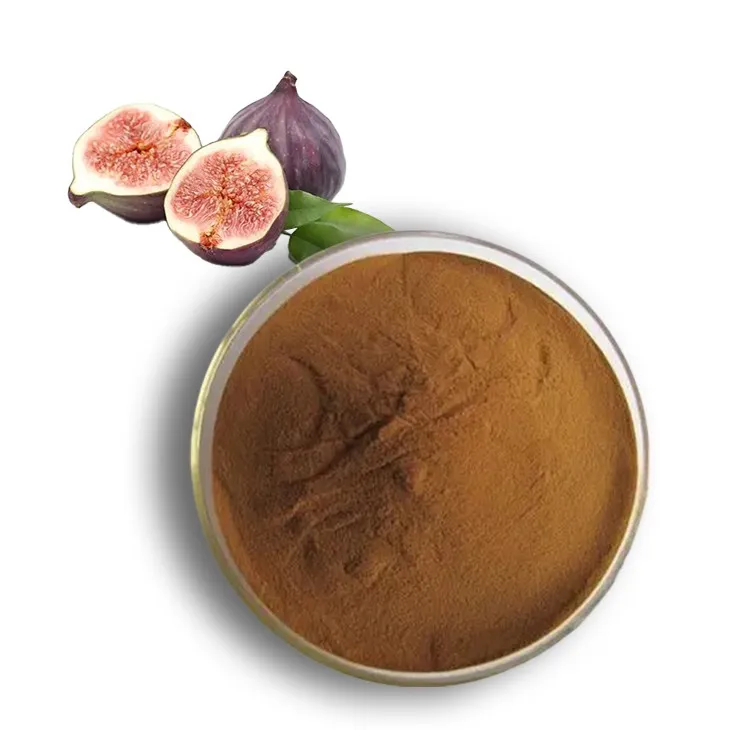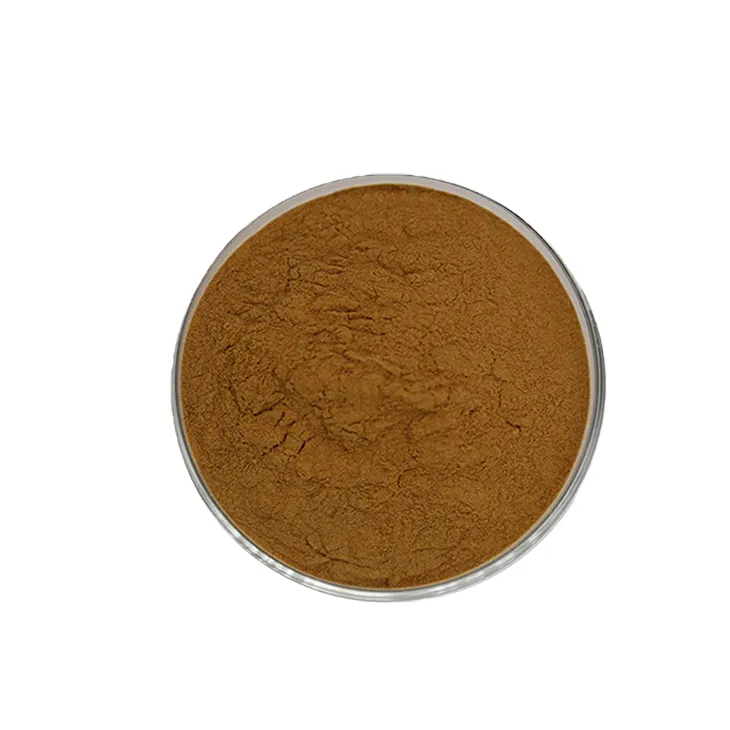- 0086-571-85302990
- sales@greenskybio.com
The best fig extract in nature.
2024-12-01

Introduction
Figs have long been a part of human history, valued for their taste, texture, and numerous health benefits. When transformed into an extract, figs offer a concentrated form of their natural goodness. This article delves into the many reasons why Fig Extract can be considered one of the best gifts from nature.

The Composition of Fig Extract
Fig Extract is rich in a variety of beneficial compounds. Phytochemicals are a major component, and among them, flavonoids and phenolic acids stand out.
Flavonoids
Flavonoids are a class of plant - based compounds known for their antioxidant properties. In fig extract, they play a crucial role in protecting the body against oxidative stress. Oxidative stress is linked to a variety of diseases, including cancer, heart disease, and neurodegenerative disorders. By scavenging free radicals, flavonoids in fig extract can help maintain the health of cells and tissues.
Phenolic Acids
Phenolic acids also contribute to the antioxidant capacity of fig extract. Additionally, they have been shown to have anti - inflammatory effects. These acids can interact with the body's immune system and help reduce inflammation at a cellular level. This is particularly important for individuals with chronic inflammatory conditions such as arthritis or inflammatory bowel disease.

Health Benefits of Fig Extract
Anti - Inflammatory Effects
As mentioned earlier, the phytochemicals in fig extract, especially phenolic acids, are associated with anti - inflammatory effects. Chronic inflammation can be a silent killer, contributing to the development and progression of many diseases. Fig extract has the potential to reduce inflammation markers in the body, which can lead to improved overall health. For example, in a study on patients with rheumatoid arthritis, those who consumed fig extract supplements showed a reduction in joint pain and swelling over time.
Weight Management
Fig extract can also be beneficial in the area of weight management. It has the ability to provide a feeling of fullness with relatively few calories. This is due to its fiber content and certain compounds that can interact with the body's satiety hormones. When people feel full, they are less likely to overeat, which can contribute to weight loss or maintenance. In addition, fig extract may also help boost the body's metabolism slightly, although more research is needed in this area.
Blood Sugar Regulation
Another important aspect of fig extract's health benefits is its potential role in blood sugar regulation. Figs contain natural sugars, but when processed into an extract, they also seem to have properties that can help stabilize blood sugar levels. Some components in fig extract may improve insulin sensitivity, allowing the body to better utilize glucose. This is beneficial for individuals with diabetes or those at risk of developing the disease. For instance, in animal studies, fig extract has been shown to reduce blood glucose levels after a meal.

Historical and Cultural Significance of Figs
Figs have a long and rich history in different civilizations around the world.
Ancient Civilizations
In ancient Egypt, figs were highly prized. They were not only a source of food but also used in medicinal preparations. The Egyptians believed that figs had healing properties and used them to treat various ailments. In ancient Greece, figs were also considered a valuable food. Athletes in the Olympic Games were often fed figs, believing that they would enhance their performance. The Greeks also recognized the medicinal value of figs and used them in traditional medicine.
Middle Eastern and Asian Cultures
In Middle Eastern cultures, figs have been a staple food for centuries. They are used in both sweet and savory dishes. In traditional Middle Eastern medicine, figs are used to treat digestive problems, respiratory issues, and skin conditions. In Asian cultures, figs are also known for their health benefits. In Ayurvedic medicine in India, figs are used to balance the body's doshas and promote overall health. In Chinese traditional medicine, figs are sometimes used in herbal remedies for coughs and constipation.
Modern Research on Fig Extract
Modern science has been actively researching fig extract to uncover more of its potential benefits.
Clinical Trials
There have been several clinical trials conducted on fig extract. These trials aim to test its efficacy in treating various diseases and conditions. For example, some trials have focused on its anti - inflammatory effects in patients with chronic diseases. Other trials have investigated its role in weight management and blood sugar regulation. The results of these trials have been promising, although more research is still needed to fully understand the mechanisms of action of fig extract.
Future Research Directions
Future research on fig extract could focus on several areas. One area is the development of more effective extraction methods to obtain a higher concentration of beneficial compounds. Another area is the study of the long - term effects of fig extract consumption. Additionally, research could be done to explore the potential synergistic effects of fig extract with other natural products or medications. For example, could fig extract enhance the effectiveness of anti - diabetic medications? Or could it work in combination with anti - inflammatory drugs to provide better treatment for chronic inflammatory conditions?
How to Incorporate Fig Extract into Your Diet
There are several ways to incorporate fig extract into your diet.
- Supplements: Fig extract is available in supplement form. These supplements can be taken daily, following the recommended dosage on the product label. However, it is important to choose a high - quality supplement from a reputable manufacturer.
- Food Products: Some food products may contain fig extract as an ingredient. For example, there are energy bars or healthy snacks that may include fig extract. Reading food labels can help you identify products that contain fig extract.
- Homemade Recipes: You can also make your own fig - extract - infused products at home. For example, you can make a fig - extract - flavored smoothie by adding a small amount of fig extract to your favorite smoothie recipe. Or you can use fig extract in baking, such as in muffins or cakes, to add a unique flavor and health benefits.
Conclusion
Fig extract is truly a remarkable product of nature. With its rich composition of phytochemicals, it offers a range of health benefits, including anti - inflammatory effects, potential for weight management, and blood sugar regulation. Its historical and cultural significance further attests to its value. Modern research is continuously uncovering more about its potential, and there are various ways to incorporate it into our daily diets. As we continue to explore the world of natural remedies, fig extract stands out as one of nature's best offerings.
FAQ:
What are the main beneficial compounds in fig extract?
Fig extract contains phytochemicals such as flavonoids and phenolic acids. These compounds are associated with anti - inflammatory effects and other potential health benefits.
How can fig extract be beneficial for those with chronic inflammatory conditions?
The flavonoids and phenolic acids in fig extract have anti - inflammatory effects. For people with chronic inflammatory conditions, these properties may help reduce inflammation in the body.
Why is fig extract considered useful in weight management?
Fig extract can provide a feeling of fullness while containing relatively few calories. This makes it potentially useful in weight management as it may help control appetite.
How does fig extract play a role in blood sugar regulation?
Although the exact mechanisms are still being studied, fig extract may have certain properties that contribute to blood sugar regulation. It might interact with the body's metabolic processes related to glucose levels.
What is the historical significance of figs in terms of their medicinal properties?
Figs have been valued for centuries in different civilizations for their medicinal properties. They have been used in traditional medicine, and now modern science is further exploring their benefits through fig extract.
Related literature
- The Health - Promoting Properties of Fig (Ficus carica L.)"
- "Fig Extract: A Promising Natural Product for Health"
- "Phytochemicals in Fig and Their Potential Health Benefits"
- ▶ Hesperidin
- ▶ Citrus Bioflavonoids
- ▶ Plant Extract
- ▶ lycopene
- ▶ Diosmin
- ▶ Grape seed extract
- ▶ Sea buckthorn Juice Powder
- ▶ Fruit Juice Powder
- ▶ Hops Extract
- ▶ Artichoke Extract
- ▶ Mushroom extract
- ▶ Astaxanthin
- ▶ Green Tea Extract
- ▶ Curcumin
- ▶ Horse Chestnut Extract
- ▶ Other Product
- ▶ Boswellia Serrata Extract
- ▶ Resveratrol
- ▶ Marigold Extract
- ▶ Grape Leaf Extract
- ▶ New Product
- ▶ Aminolevulinic acid
- ▶ Cranberry Extract
- ▶ Red Yeast Rice
- ▶ Red Wine Extract
-
Curcuma Longa Extract
2024-12-01
-
Shikone Extract
2024-12-01
-
Milk Thistle Extract
2024-12-01
-
Citrus bioflavonoids
2024-12-01
-
Red Date Extract
2024-12-01
-
Feverfew Extract
2024-12-01
-
Baicalin
2024-12-01
-
Coix Seed Extract
2024-12-01
-
Saw Palmetto Extract
2024-12-01
-
Lily extract
2024-12-01





















